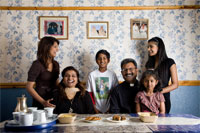"Don't be a stranger." Many of us will have said this affectionately to our families and friends.
But Jesus doesn't ask us just to love those we would naturally share our lives with. Instead, he challenges us to re-evaluate who our neighbours are and to welcome those we consider to be strangers.
Migration is one of the biggest media and political issues facing Britain today, and many Christians are dedicated to helping, supporting and loving these new neighbours. Here are some of their stories.
Church and integration
Filling out forms, negotiating with landlords, even understanding basic English - churches who work with migrants are discovering how huge these obstacles can be for them.
Major David Blowers, from The Salvation Army in Margate, works with Czech and Slovak migrants, particularly Roma, teaching English or helping them fill in forms.
"Sometimes the problem is simply that they don't speak English well enough to get everything sorted out," he says.
In Northern Ireland, a cross-denominational group of Christians came together in 2001 to found the organisation Embrace, which promotes a positive response to migrants.
The Reverend Richard Kerr, a Presbyterian minister and Embrace committee member, says: "People's views on refugees and asylum seekers are often more informed by the Daily Mail than the Bible. We try and get Christians to think about their responsibility to the people coming into our communities."
Church and Community
"The church was influential in us settling in. They were a God-send, they came and gave us clothes and whatever we needed."
Phuoc Tan Diep was just three years old when his family fled war-torn Vietnam, arriving in Wolverhampton in 1978, but the church's kindness to his family made a lasting impression.
Efforts are being made to extend a similar welcome to the latest influx of Polish refugees. The Evangelical Alliance UK, European Christian Mission, Fellowship of Churches of Christ in the UK and Global Connections are currently consulting with the Polish Evangelical Alliance and English churches and agencies involved with Polish migrants.
Church and Worship
We may all be worshipping the same God, but when migrants arrive in the UK they can soon find the different expressions of worship an extra culture-shock, especially if they can't understand what's being said.
Christians across Britain are working out their own ways of accommodating new cultures of worship.
The Reverend Irfan John, who works with ethnic minority congregations in Wales for the Methodist Church, recently started Cardiff's first Urdu worship service.
Wesleyan Christian Centre pastor, the Reverend Elson Parris, may be a Barbadian living in north London, but that doesn't stop him also overseeing a Portuguese congregation. The church has an English service in the morning and a Portuguese one in the evening, with a monthly joint celebration.
"We try to create an atmosphere where each culture can engage and enjoy each other", he says.
Church and Advocacy
Working with asylum seekers proved to be a watershed for Dave Smith in terms of his attitude to campaigning.
"I was fairly non political until this issue came up for me," he says.
"I then realised that Christians need to be political beings as well as spiritual ones. Someone should not be able to differentiate between the two - Jesus was very political and challenged the rulers of his time."
Dave is director of the Boaz Trust, which supports asylum seekers in the North West of England. As well as giving practical care, Boaz promotes justice for asylum seekers and refugees.
The Reverend David de Verny, a former Church of England chaplain to migrant workers in Boston, Lincolnshire, believes passionately that Christians must take action on injustice.
"I think the churches must lead, otherwise we betray Jesus."
Church and evangelism
"Christians need to recognise that we are a family, born and created in the image of God. That is our common identity: regardless of culture, colour, political or religious background we are one people under God."
The Reverend Arlington Trotman, a Methodist minister, has been working on issues around migration, asylum and racial justice for more than 10 years, and runs the Churches Commission for Migrants in Europe.
His words reflect the motivation that drives Christians across the country to serve, welcome, fight for and honour the migrant in their communities.
Major David Blowers says that in Margate, social action came first, followed by a successful attempt to set up a Czech speaking congregation.
Maron Ehata, originally from the Democratic Republic of Congo, was helped by the Boaz Trust on his arrival in England.
"Dave Smith and another worker called Mark saw that I was depressed and asked if they could pray with me," he says.
"This moment really brought me back to a belief in God."
What can you do? Some tips to help migrants in your area
1. Invite migrants into your home for a meal.
2. Create a drop-in centre.
3. Offer practical assistance, like tutoring English, filling out forms, or helping migrants to locate a doctor.
4. Hold an international event, inviting local people and migrants to mix together.
5. Be an advocate for migrants - either by writing to your MP or Government agencies, or by correcting the view that friends and family may have of migrants from some sections of the press.
For more information go to the Don't Be a Stranger website: www.nostrangers.org.uk


